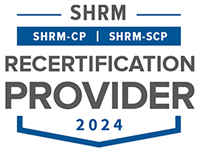
The use of this seal confirms that this activity has met HR Certification Institutes (HRCI) criteria for recertification credit pre-approval.
This activity has been approved for
1.5 HR
(General) recertification credit hours toward aPHR, PHR, PHRca, SPHR, GPHR, PHRi and SPHRi recertification through HR Certification Institute (HRCI). Please make note of the activity ID number on your recertification application form. For more information about certification or recertification, please visit the HR Certification Institute website at www.hrci.org." ...more
 Traininng.com LLC is recognized by SHRM to offer Professional Development Credits (PDCs) for the SHRM-CP® or SHRM-SCP®.
?
Traininng.com LLC is recognized by SHRM to offer Professional Development Credits (PDCs) for the SHRM-CP® or SHRM-SCP®.
?
1-hour educational program = 1 PDC.
1-hour and 15 minute concurrent conference session = 1.25 PDCs.
3-hour e-learning course = 3 PDCs.
Overview
Companies are understandably concerned about the safety of their workers and customers as well as their own assets and public image. But today, many employers are finding that the best approach to hiring individuals with criminal backgrounds is not so different from the hiring approach they use for everyone else: to evaluate each candidate on his or her merits.
Before hiring a job candidate, screening the applicant’s background helps employers make safe and well-informed decisions about whether they will be trustworthy and competent employees.
Criminal background check guide
- Criminal background checks are often part of this process and may even be required for new hires if your company is in certain regulated industries or serves vulnerable populations, such as children, the elderly, or the disabled.
- Given that properly accessing and reviewing all of the important sources for an applicant’s criminal history requires extensive time, resources, and familiarity with complex laws and regulations.
What is a Criminal Background Check?
- When CRAs conduct criminal background checks for employment, they gather and analyze background information from municipal, state, county, and federal criminal records databases for job applicants.
- The types of information that might be reported include misdemeanor and felony convictions and pending criminal matters.
- Different searches might produce different records. For example, if an employer only searches a state’s criminal records repository, the employer will only receive information about any convictions and arrests that are contained in the state’s criminal justice system.
- Employers might instead elect to complete nationwide searches to find criminal record information from multiple states or perform searches in every county and state where an applicant has lived.
Why you should Attend
Employers who use criminal records in their hiring decisions need to be aware of applicable federal and state laws. Additionally, the Fair Credit Reporting Act (FCRA) governs how employers obtain and handle consumer reports, which include standard background checks. Legal compliance with these laws is key when considering formerly incarcerated applicants for hire.
BAN-THE-BOX LAWS
Several state laws and local ordinances limit the use of arrest and conviction records by prospective employers. Commonly referred to as "ban-the-box" laws, these restrictions prohibit the employer from asking an applicant any questions about criminal records on the employment application or early in the screening process. Other state laws restrict the employer's use of arrest or conviction data in making an employment decision, except in limited circumstances, or the laws may require that criminal history questions be asked only after an offer of employment has been made. Employers should investigate any state or local laws prior to asking about an applicant's criminal history.
Areas Covered in the Session
- Learn how criminal background checks are a critical part of onboarding and avoiding negligent hiring.
- Learn why regulations are protecting formerly incarcerated individuals in the workplace.
- Learn what states have Ban the Box mandated protections.
- Learn what the process is when conducting a criminal background check.
- Learn what the requirements are when you rescind an offer of employment after learning about the results of a criminal background check.
Who Will Benefit
- All Employers
- Business Owners
- Company Leadership
- Compliance professionals
- Payroll Administrators
- HR Professionals
- Compliance Professionals
- Managers/Supervisors
- Employers in all industries
- Small Business Owners
Speaker Profile
Margie Faulk, a senior level human resources and compliance professional with over 14 years of HR management and compliance experience. A current Compliance Officer/Advisor for HR Compliance Solutions, LLC. Margie has worked as an HR and Compliance advisor for major corporations and small businesses in the small, large, private, public and Non-profit sectors.
This includes Federal Contracting in the defense, military, anti-Terrorism and Apache Helicopter Training Simulations with Federal Acquisition Regulations (FAR), Federal Sentencing Guidelines (FSG) and Office of Federal Contract Compliance Program (OFCCP). Margie is bilingual (Spanish) fluent and Bi-cultural.
Margie's focus has expanded to Global Workplace Compliance in International, multi-state, multi-National, state and local workplace compliance which includes workplace compliance in other countries like the UK, Canada, France, Brazil, China, Africa, Mexico and India, just to name a few. Margie has created and presented seminars/webinars for many compliance institutes. These national training providers, offer compliance training to HR professionals, business owners and companies interested in having their company compliant with workplace and industry regulations.
Margie holds professional human resources certification (PHR) from the HR Certification Institution (HRCI) and SHRM-CP certification from Society for Human Resources Management. Margie is a member of the Society of Corporate Compliance & Ethics (SCCE).

 Traininng.com LLC is recognized by SHRM to offer Professional Development Credits (PDCs) for the SHRM-CP® or SHRM-SCP®.
?
Traininng.com LLC is recognized by SHRM to offer Professional Development Credits (PDCs) for the SHRM-CP® or SHRM-SCP®.
?